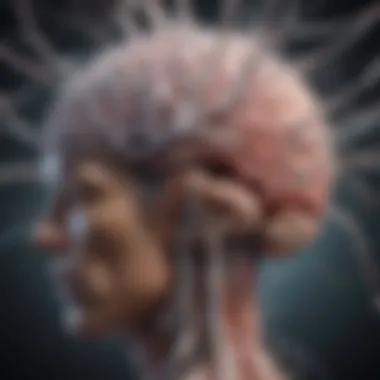Unveiling the Cognitive Flexibility Mechanism: A Detailed Exploration of Brain Age Switch


Game Reviews
Indulge in a profound exploration of the brain age switch through the lens of cognitive flexibility. Unveil the intricate relationship between cognitive adaptability and its profound effects on brain function and overall well-being. Delve into the scientific underpinnings of neuroplasticity and gain practical insights on augmenting cognitive flexibility for an optimized mental agility.
Overview
Gain a comprehensive understanding of the brain age switch phenomenon and its implications on cognitive function. Acquaint yourself with the fundamental concepts underlying cognitive flexibility and its role in shaping neuroplasticity.
Gameplay
Embark on a journey through the intricacies of cognitive adaptability and its impact on brain health. Explore the interactive dynamics between cognitive flexibility and mental acuity, unraveling the mechanisms that drive adaptive thinking and problem-solving.
Storyline
Immerse yourself in the compelling narrative of neuroplasticity and cognitive flexibility. Trace the evolutionary storyline of brain age switching and its evolutionary significance in enhancing cognitive resilience and adaptability.
Graphics
Visualize the intricate details of cognitive flexibility through a metaphorical lens. Engage with the vivid imagery of neural connections and synaptic plasticity, painting a picture of the brain's adaptive prowess.
Soundtrack
Harmonize with the symphony of cognitive adaptation and resilience. Tune into the subtle nuances of neuroplasticity's auditory cues and the transformative melody of cognitive flexibility unfolding.
Pros & Cons
Evaluate the benefits and challenges of enhancing cognitive adaptability. Uncover the strengths and limitations of leveraging neuroplasticity for optimizing mental agility and cognitive function.
Final Verdict
Culminate your exploration of the brain age switch with a conclusive reflection. Synthesize the key insights gleaned throughout this comprehensive guide, offering a nuanced perspective on unlocking cognitive flexibility's potential for holistic well-being.
Introduction


In delving into the intricate realm of unlocking the brain age switch, a profound understanding of cognitive flexibility becomes paramount. This article embarks on an enlightening journey exploring the profound impact of cognitive flexibility on brain function and overall well-being. It uncovers the scientific intricacies of neuroplasticity and provides practical tips on enhancing cognitive adaptability. By delving into this comprehensive guide, individuals are equipped with valuable insights to optimize their mental agility and embrace the complexities of their cognitive processes. Definition of Brain Age Switch
rstanding Cognitive Flexibility
Unveiling the specific nuances of cognitive flexibility is crucial to comprehending the brain age switch paradigm. This facet of cognitive flexibility plays a pivotal role in our ability to adapt, learn, and thrive in our dynamic environments. The key characteristic of understanding cognitive flexibility lies in its capacity to enhance problem-solving skills, decision-making processes, and mental adaptability. This article chooses to emphasize understanding cognitive flexibility due to its instrumental role in shaping our cognitive resilience and fostering mental agility. The unique feature of this component is its innate ability to rewire neural pathways and mold our cognitive processes, a practice essential for cognitive well-being. Understanding cognitive flexibility offers a plethora of advantages, including heightened adaptability, improved learning capacity, and enhanced overall brain function within the context of this article.
Imp
e of Neural Plasticity
The importance of neural plasticity within the brain age switch narrative cannot be understated. Neural plasticity elucidates the brain's remarkable ability to reorganize itself by forming new neural connections throughout life. This essential characteristic is a popular choice for discussion within this article as it underscores the brain's adaptability and inherent capacity for growth. The unique feature of neural plasticity lies in its ability to facilitate learning, memory consolidation, and cognitive development, enriching the cognitive processes explored in this article. The advantages of neural plasticity manifest in improved cognitive functions, enhanced adaptability to new situations, and increased neuroplastic potential within the scope of this article.
Significa
n Neurology
Effects on B
ealth
Exploring the effects on brain health unveils a profound understanding of how the brain age switch influences our overall well-being. By deciphering the intricate connections between cognitive flexibility and brain health, we gain insights into the crucial role neural plasticity plays in maintaining a healthy brain. The key characteristic of the effects on brain health lies in their ability to stave off cognitive decline, enhance memory functions, and promote overall cognitive vitality. This discussion is a beneficial choice for this article as it sheds light on the intricate balance between cognitive flexibility and brain health. The unique feature of the effects on brain health is their potential to mitigate neurodegenerative diseases, enhance cognitive resilience, and bolster overall brain function within the narrative of this article.
Impact on Cogniti
lities
The impact of cognitive abilities within the brain age switch framework is a critical aspect to analyze in understanding cognitive flexibility. Unveiling how cognitive flexibility shapes our cognitive abilities sheds light on our decision-making processes, problem-solving capabilities, and overall mental acuity. The key characteristic of the impact on cognitive abilities lies in its role in enhancing cognitive agility, fostering creative thinking, and optimizing mental performance. This component is a popular choice for exploration in this article due to its significant influence on shaping our cognitive repertoire. The unique feature of the impact on cognitive abilities lies in its potential to optimize neural networks, improve cognitive processing speed, and elevate cognitive functions within the context of this article.
Exploring Neuroplasticity
Neuroplasticity, a pivotal concept in neuroscience, examines the brain's remarkable ability to reorganize itself by forming new neural connections throughout life. Within the context of this article, exploring neuroplasticity unveils the profound impact such adaptability has on cognitive development and overall brain health. By shedding light on the intricate processes of neurogenesis and synaptic plasticity, this section aims to provide a detailed insight into how the brain's flexibility can be harnessed for optimal functioning.


Neurogenesis and Synaptic Plasticity
Formation of New Neurons
The formation of new neurons, known as neurogenesis, stands at the forefront of brain plasticity as it signifies the brain's capacity for regeneration and growth. In this critical exploration, the focus lies on understanding how the birth of neurons contributes to enhancing cognitive abilities and promoting neural regeneration. The unique characteristic of neurogenesis lies in its role in shaping brain structure and enhancing memory formation. This crucial aspect of forming new neurons offers a promising avenue for cognitive improvement and rejuvenation within the realm of this article. The advantages of neurogenesis in bolstering cognitive flexibility will be meticulously elucidated to underscore its significance in enhancing overall brain function.
Adaptation of Synaptic Connections
The brain's ability to adapt synaptic connections, known as synaptic plasticity, plays a fundamental role in learning, memory, and cognitive processes. This section delves into the intricate mechanisms through which synaptic connections reorganize and strengthen based on experiences and learning. Highlighting the key characteristic of synaptic plasticity, the discussion centers on its function in neuronal communication and information processing. By illustrating the unique feature of synaptic plasticity in facilitating adaptive responses to stimuli, this article underscores its pivotal role in optimizing cognitive flexibility and fostering ongoing neural adaptation. The advantages of synaptic plasticity will be examined, emphasizing its potential in fortifying cognitive resilience and improving mental agility within the framework of this article.
Strategies to Enhance Cognitive Flexibility
Strategies to Enhance Cognitive Flexibility play a pivotal role in this article by delving deep into methods to optimize mental agility and cognitive adaptability. Understanding these strategies is crucial for individuals aiming to enhance their brain function and overall well-being. By incorporating specific elements such as mindfulness, meditation, physical exercise, and lifelong learning opportunities, individuals can significantly boost their cognitive flexibility. These strategies offer diverse benefits ranging from improved memory retention to enhanced problem-solving skills. Considerations about Strategies to Enhance Cognitive Flexibility include personalizing these techniques to suit individual preferences and integrating them seamlessly into daily routines.
Mindfulness and Meditation Techniques
- Mindful Awareness Practices: Exploring Mindful Awareness Practices sheds light on an essential aspect of enhancing cognitive flexibility. By practicing presence and mindfulness, individuals can cultivate a heightened sense of focus and awareness, leading to improved cognitive function. The key characteristic of Mindful Awareness Practices lies in promoting attentiveness to the present moment, facilitating better concentration and mental clarity. This technique stands out as a popular choice in the article due to its proven effectiveness in reducing stress and enhancing overall well-being. Its unique feature of increased self-awareness contributes to better decision-making and emotional regulation, making it advantageous for individuals seeking to optimize cognitive flexibility.
- Cognitive Reframing Exercises: Diving into Cognitive Reframing Exercises highlights another valuable tool for boosting cognitive flexibility. This technique involves challenging negative thought patterns and reframing them into more positive and constructive perspectives. The key characteristic of Cognitive Reframing Exercises lies in promoting cognitive restructuring, allowing individuals to approach challenges with a growth mindset. It is a beneficial choice in the article as it fosters resilience and adaptive thinking, crucial for navigating complex cognitive tasks. The unique feature of enhancing perspective shifts and fostering resilience underscores the advantages of Cognitive Reframing Exercises in augmenting cognitive flexibility.
Physical Exercise and Brain Health
- Aerobic Fitness Impact: Examining the Aerobic Fitness Impact reveals a crucial aspect of enhancing cognitive flexibility through physical activity. Engaging in aerobic exercise has been shown to boost cognitive function by increasing oxygen flow to the brain and promoting neuroplasticity. The key characteristic of Aerobic Fitness Impact lies in enhancing overall brain health and cognitive performance, making it a popular choice in the article. Its unique feature of stimulating the production of growth factors that support brain health underscores the advantages of integrating aerobic fitness into strategies for cognitive flexibility.
- Neuroprotective Benefits: Delving into Neuroprotective Benefits underscores the importance of safeguarding brain health for optimal cognitive flexibility. These benefits include the protection of neurons from damage and the promotion of neuronal growth and connectivity. The key characteristic of Neuroprotective Benefits lies in enhancing cognitive resilience and reducing the risk of cognitive decline, making it a popular choice in the article. Its unique feature of preserving brain function and promoting longevity underscores the advantages of incorporating neuroprotective strategies into cognitive flexibility practices.
Lifelong Learning Opportunities
- Continual Education Initiatives: Exploring Continual Education Initiatives reveals an essential aspect of enhancing cognitive flexibility through ongoing intellectual stimulation. Engaging in continual learning initiatives such as courses, workshops, and seminars can broaden knowledge and foster cognitive agility. The key characteristic of Continual Education Initiatives lies in promoting a growth mindset and stimulating curiosity, making it a beneficial choice in the article. Its unique feature of promoting neuroplasticity and enhancing cognitive reserve underscores the advantages of lifelong learning opportunities in boosting cognitive flexibility.
- Intellectual Stimulation: Delving into Intellectual Stimulation highlights the significance of engaging in intellectually stimulating activities for cognitive enhancement. Intellectual Stimulation involves challenging the brain through puzzles, reading, and strategic games to maintain cognitive sharpness. The key characteristic of Intellectual Stimulation lies in fostering cognitive engagement and enhancing problem-solving skills, making it a valuable choice in the article. Its unique feature of promoting neural connections and enhancing information processing underscores the advantages of incorporating intellectual stimulation into strategies for cognitive flexibility.
Practical Applications in Daily Life
Understanding the significance of Practical Applications in Daily Life is crucial within the realm of cognitive flexibility and brain function. This section focuses on real-world implementations that can enhance cognitive adaptability for individuals seeking to optimize their mental agility. By delving into Memory Training and Cognitive Exercises, individuals can explore various techniques like Memory Mnemonic Techniques and Brain Teasers and Puzzles to sharpen memory and problem-solving skills.
Memory Training and Cognitive Exercises
Memory Mnemonic Techniques


Memory Mnemonic Techniques play a pivotal role in cognitive enhancement by providing individuals with effective memory aids. These techniques involve associating complex information with more easily remembered constructs, facilitating easier retrieval and retention of crucial details. The key characteristic of Memory Mnemonic Techniques lies in their ability to simplify complex data into manageable components, aiding in information recall. Such techniques are highly beneficial in this context due to their proven efficacy in bolstering memory and cognitive processing. The unique feature of Memory Mnemonic Techniques is their adaptability across various learning styles, catering to visual, auditory, or kinesthetic preferences. Despite their advantages in boosting memory retention, these techniques may pose challenges for individuals unfamiliar with mnemonic strategies within this cognitive enhancement framework.
Brain Teasers and Puzzles
Another valuable aspect of Memory Training and Cognitive Exercises is the inclusion of Brain Teasers and Puzzles. These elements contribute significantly to enhancing cognitive flexibility by challenging problem-solving abilities and fostering creative thinking. The key characteristic of Brain Teasers and Puzzles is their ability to engage the mind in critical thinking tasks, promoting mental dexterity and agility. This choice proves beneficial in this article, as such activities stimulate neural pathways, leading to improved cognitive functions. The unique feature of Brain Teasers and Puzzles lies in their ability to provide immediate feedback on cognitive performance, allowing individuals to track their progress effectively. However, constant engagement with challenging puzzles and teasers may lead to mental fatigue, highlighting a potential disadvantage for some individuals.
Adaptive Decision-Making Strategies
Moving beyond memory enhancement, the section of Adaptive Decision-Making Strategies sheds light on critical skills like Risk Assessment and Problem-Solving. These strategies are essential for individuals seeking to improve decision-making processes and enhance cognitive flexibility within daily life scenarios.
Risk Assessment Skills
Risk Assessment Skills contribute significantly to overall cognitive function by enabling individuals to evaluate potential dangers or uncertainties in different situations. The key characteristic of Risk Assessment Skills is their emphasis on systematic evaluation and consideration of various outcomes before making decisions. This choice proves beneficial in this article due to its direct impact on enhancing critical thinking and foresight abilities. The unique feature of Risk Assessment Skills is their adaptability across multiple domains, ranging from personal to professional settings, demonstrating versatility in cognitive improvement. Despite their advantages in promoting cautious decision-making, these skills may present disadvantages when individuals face time-constrained or complex decision-making scenarios.
Problem-Solving Approaches
Lastly, Problem-Solving Approaches are crucial for refining cognitive flexibility by honing analytical and creative thinking skills. The key characteristic of Problem-Solving Approaches is their emphasis on identifying, analyzing, and resolving complex issues through structured methods. This choice is advantageous in this article as it promotes active engagement with challenging problems, fostering intellectual growth and adaptability. The unique feature of Problem-Solving Approaches lies in their applicability to diverse contexts, allowing individuals to approach problems from multiple perspectives systematically. However, these approaches may have drawbacks when individuals encounter novel or ambiguous problems that do not align with traditional problem-solving frameworks within this cognitive enhancement context.
Conclusion
Implications for Personal Development
Empowering Cognitive Resilience
Delving into the realm of cognitive resilience, we unearth a specific aspect focused on bolstering one's ability to adapt and respond effectively to various cognitive demands. Cognitive resilience serves as a cornerstone in fortifying the brain against challenges, allowing for smoother navigation through mental tasks and complexities. The key characteristic of empowering cognitive resilience lies in its capacity to foster adaptive behaviors and thought patterns, enabling individuals to thrive in diverse cognitive settings.
Enhancing Mental Flexibility
Enhancing mental flexibility is crucial in promoting cognitive dexterity and problem-solving skills. By honing the ability to adapt swiftly to new information and contexts, individuals can broaden their cognitive repertoire and innovate novel solutions to complex problems. The unique feature of enhancing mental flexibility is its role in expanding cognitive horizons and fostering creative thinking, thus enhancing overall cognitive performance.
Future Research Directions
Exploration of Novel Therapies
The exploration of novel therapies opens new frontiers in harnessing cognitive flexibility for enhanced brain function. By delving into innovative therapeutic approaches, researchers can uncover groundbreaking methods to optimize neuroplasticity and cognitive adaptability. The key characteristic of this exploration lies in its potential to revolutionize cognitive enhancement techniques, offering promising avenues for addressing cognitive limitations and maximizing brain potential.
Application in Age-Related Disorders
Exploring the application of cognitive flexibility in age-related disorders unveils a critical approach to mitigating cognitive decline and enhancing brain health in older populations. By tailoring cognitive interventions to address specific age-related challenges, individuals can tap into the power of neuroplasticity to maintain cognitive vitality and independence. The unique feature of this application is its potential to preserve cognitive function and alleviate the burden of age-related cognitive impairments, offering a ray of hope for future cognitive wellness.



